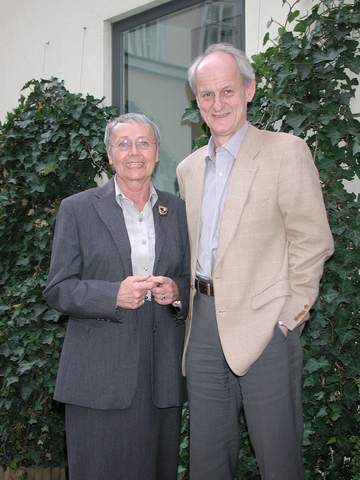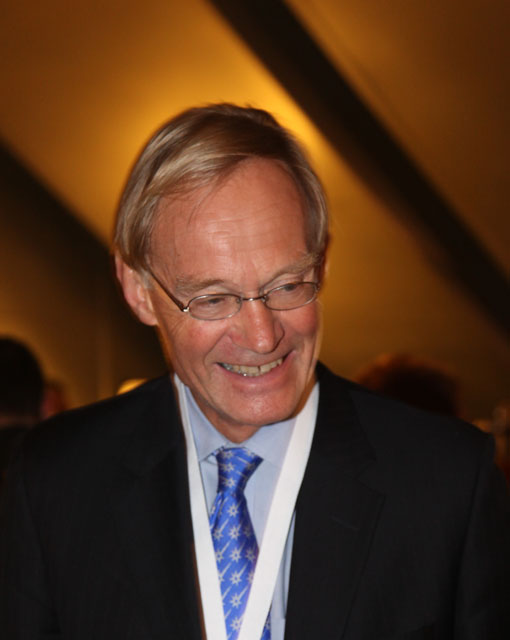Philosophy

Jes Olesen
The European Federation of Neurological Societies (EFNS) Origins of the EFNS
The EFNS was founded in December 1991 in Vienna, Austria. Today, all national neurological associations and societies throughout Europe with affiliation to the World Federation of Neurology (WFN) are registered members of the EFNS. The EFNS is the only organization to join and support neurologists across the whole of Europe.
The Role of the EFNS is:
- To advance development of the neurological science throughout Europe
- To stimulate, encourage and help develop European programmes of clinical and experimental neurological research and teaching
- To promote international exchange arrangements for neurologists and neuroscientists, especially those in training
- To handle current political issues in neurology on behalf of its members
The EFNS provides:
- European neurology congresses
- International symposia and workshops in clinical neurology and related neuroscience throughout Europe
- Postgraduate teaching courses in neuroscience
- A central network of renowned neurologists to provide a base of expertise
- Guidelines for diagnostic, therapeutic, rehabilitation and social programmes in clinical neurology
- Collaboration for international research projects, especially those of an epidemiological nature
- An international scientific journal
- A quarterly newsletter to all members

Richard Hughes
The vision and missions of the European Federation of Neurological Societies Richard Hughes President of the EFNS
Vision: excellence in European Neurology
The European Federation of Neurological Societies, better known by its abbreviation EFNS, aims to make European neurology the equal of the best in the world. It provides a common home for European neurological patient care, research, education and partnership. Our annual congress is an important, and the most visible, manifestation of our vision but not the only one. The EFNS Council has affirmed ten missions.
Mission 1. A strong organization of European Neurology
There are national neurological societies in every European country and 44 have elected delegates to represent their country on the Council of the EFNS. The Council meets annually at our Congress. It elects the officers who form its Management Committee and conduct the day to day business of the Federation. The EFNS has its Head Office in Vienna which is managed by our Executive Director, Lisa Müller, and branch offices in Florence and Prague. This managerial and administrative structure underpins the nine other missions of the EFNS.
Mission 2. Taking care of neurological patients in Europe
The EFNS aims to advance the development of neurology as the major medical specialty caring for patients with neurological disorders. As medicine becomes more and more specialized we have seen some groups of diseases fall increasingly into the hands of other specialties, pain under the care of anaesthetists, sleep disorders under respiratory physicians, stroke under elderly care physicians and chronic disorders under rehabilitation specialists. Communication and collaboration with these related specialties is helpful and should be encouraged but we should not abandon the care of these primarily neurological disorders to other specialties. Their pathology is the pathology of the nervous system and advances in care are most likely to come from neuroscience of which we should be the masters. We have a scientific committee chaired by Professor Michael Brainin, Austria, which oversees 24 scientist panels covering all the major sub- (or super-) specialties within neurology. The panels are well placed to encourage and supervise the development of their fields.
Mission 3. High quality of neurological health care
We aim to strengthen the standard, availability, and uniformity of neurological services in Europe. The Scientist Panels have set up task forces which have written guidelines on the management of important neurological diseases which are freely available on line on the EFNS web site. The first 41 guidelines were published in the first edition of the European Handbook of Neurological Management edited by myself with Professor Michael Brainin and Professor Nils-Erik Gilhus, Norway, in 2006. The second edition edited by Professors Nils Erik Gilhus, Michael Brainin and Michael Barnes with 40 updated guidelines will be published at this Congress. The guidelines are evidence based where possible but where not are based on the consensus of experts from different European countries and are in any case peer reviewed by the Scientific Committee. The guidelines form a benchmark to which all European neurologists can aspire and against which individuals and individual countries can audit their practice.
Mission 4. Multidisciplinary collaboration and partnership
We aim to strengthen collaboration between ourselves and related professional and lay organizations. We particularly appreciate a close liaison to the point of merging with the management committees of European sub-specialty organizations and have negotiated close working arrangements with the Movement Disorders Society – European Section, European Headache Federation and European Federation of Autonomic Societies. We would welcome others. Just as, or even more important, is our close alliance with our sister patient organization the European Federation of Neurological Associations (see www.efna.net) which helpfully brings together all the European organizations of people with different neurological diseases. Their enthusiastic support and contribution under the indefatigable presidency of Mary Baker MBE are particularly welcome. The Good Life sessions which they organize at each EFNS congress should not be missed for being thought provoking and enjoyable at the same time. The backing of EFNA was key to the formation of the European Brain Council with the EFNS. The EBC (see www.europeanbraincouncil.org) was founded in 2002 and is formed by ourselves, EFNA, the European organisations responsible for neurosurgery, psychiatry, basic neuroscience and industry. The EBC aims to increase the European resources devoted to research, teaching and care of brain diseases. It has been successful in increasing the neurological share of the European Union research budget from 260 million € in 2000 to 381 million € in 2007.
Mission 5. Excellence in clinical neurological research - the cornerstone of progression
We aim to improve the quality of European neurological research through supporting research activities, encouraging collaboration, and promoting dissemination of research results. The annual congress, organised by the Congress Programme Committee and chaired by Professor Gian Luigi Lenzi, Italy and from now by Professor Nils Erik Gilhus, Norway, attracts about 5000 delegates from about 106 countries within and outside Europe. Twelve main topics, 15 focused workshops, about 1500 posters and special sessions are presented during the congress. To further support and encourage training in research the EFNS awards 8 scientific research fellowships each year to enable neurologists in training to spend up to 12 months in another European scientific department undertaking a research project. The scientist panels undertake research projects at a European level and use the Congress as an opportunity to hold collaborative meetings. If you have research interests that would benefit from a European dimension you are encouraged to contact the relevant panel chair who can be identified through the EFNS website. The EFNS owns the European Journal of Neurology which has a high and rising profile in the international clinical neurology publishing scene. For those interested in such statistics, the impact factor has increased to 2.7 and the journal has risen into the top third of clinical neurology journals.
Mission 6. Clinical and basic neuroscience – two interacting themes
We aim to strengthen the integration between basic neuroscience and clinical neurology by promoting bidirectional translational research. The EFNS congresses include basic science lectures in the main themes and workshops and many basic science abstracts are accepted for oral and poster presentations. Each scientist panel awards prize certificates for the best presentation in their specialty. Two Uschi Tschabitscher prizes for neurologists in training are awarded at each Congress, one for a basic science presentation. Basic science underpins much of the work of the scientific committee and scientist panels.
Mission 7. High standards in neurological education throughout Europe
We aim to strengthen the standard, availability and equality of pre-graduate and post-graduate neurological education for neurologists and related professionals throughout Europe. The newly formed Training and Education committee, chaired by Professor Jean-Marc Léger, France, oversees several sub-committees disseminating postgraduate neurological training. The Teaching Course sub-committee has, as usual, organized 26 teaching courses which will provide Continuing Medical Education to attendees at this Congress. Professor László Csiba, Hungary, and Professor Detlef Kömpf, Germany, have the responsibility for organizing popular regional teaching courses in Eastern European countries. Courses will be held in Odessa, Ukraine, Ufa, Russia and Chisinau, Moldova in 2010. Professor Pavel Kalvach organizes an annual academy for 120 neurologists in training in Staré Splavy, Czech Republic. An e-learning sub-committee chaired by Professor Thomas Berger is charged to set up an e-learning programme which will bring the EFNS neurological training programmes to an even wider constituency.
Mission 8. A platform for teaching activities at European level
We aim to provide a common platform for the integration of high quality, standardized neurological teaching activities at the European level. We collaborate with the European Neurological Society and Union of European Medical Specialists to form the European Board of Neurology (UEMS-EBN) which sets annual examinations to test proficiency in neurology. The second examination will take place at this Congress. The examination builds on the work of the Education Committee to provide neurologists in training the opportunity of testing themselves against pan-European standards.
Mission 9. Raising public awareness about neurological disorders in Europe
We aim to raise awareness in the European lay public and among health care providers and politicians about the importance and implications of neurological disorders. Journalists are welcomed at our annual Congress where there is a press office and the Congress is regularly reported in the medical and lay press. At a political level, our major lobbying is done by the European Brain Council which is co-chaired by a Member of the European Parliament and has the ear of Brussels. Five years ago, we sponsored an important initiative to measure the cost of neurological disorders in Europe (European Journal of Neurology 2005 volume 12 supplement 1). We are now sponsoring an update led by Professor Jes Olesen, former President of the EFNS.
Mission 10. Contributing to neurological health care worldwide
We aim to strengthen the collaboration between European neurology and related international health organisations. We are holding talks about increasing co-operation with the European Neurological Society so that we can work together to make European neurology the finest in the world. We have from our foundation in 1991 been a constituent part of the World Federation of Neurology (WFN) and form its European section. We have an agreement with the WFN that we will not hold an EFNS congress in a year when there is a World Congress of Neurology in Europe. This last happened in 2001 when I chaired the Congress Programme Committee in London and will next happen in 2013 when the World Congress will be in Vienna. We have close relationships with the neurological societies in neighbouring regions, including the Mediterranean societies of Algeria, Egypt, Jordan, Lebanon, Libya, Morocco, Syria and Tunisia, and the Pan-Arabic Union of Neurological Societies with whom we exchange representatives at our Congresses. Looking slightly further afield, we have been delighted to join leading African neurologists in organising teaching courses for the growing number of neurologists in Africa. These courses are also sponsored by the WFN and the International Brain Research Organization. So far courses have been held in Senegal and Ethiopia and at the time of writing one is planned for the Ivory Coast.